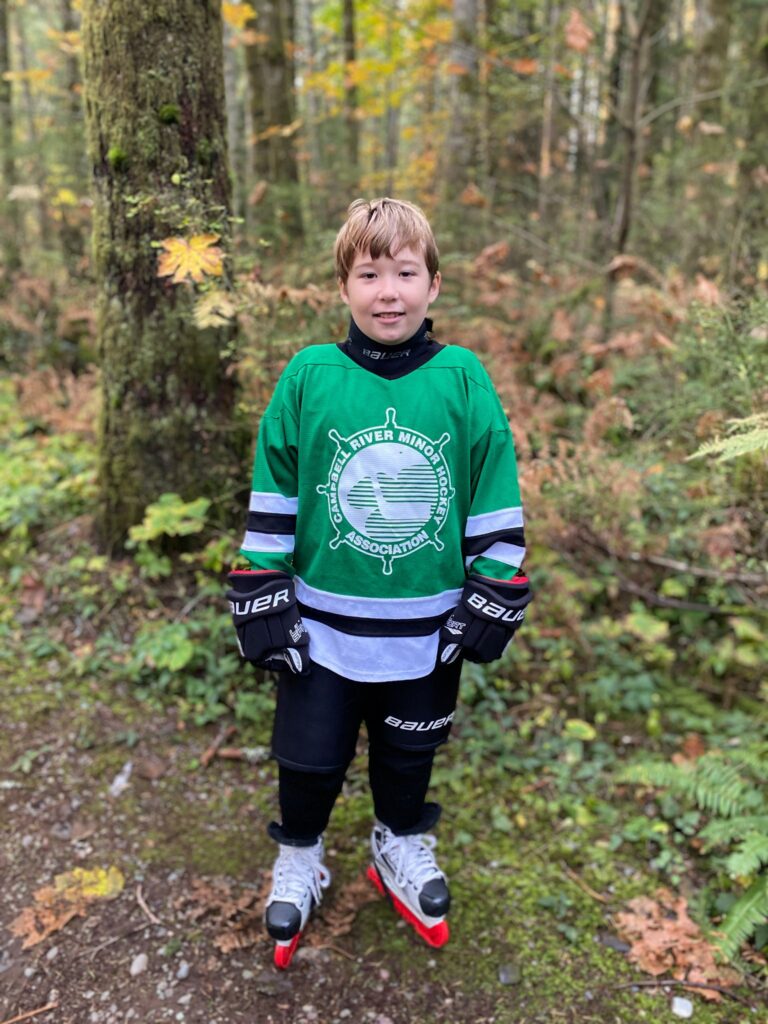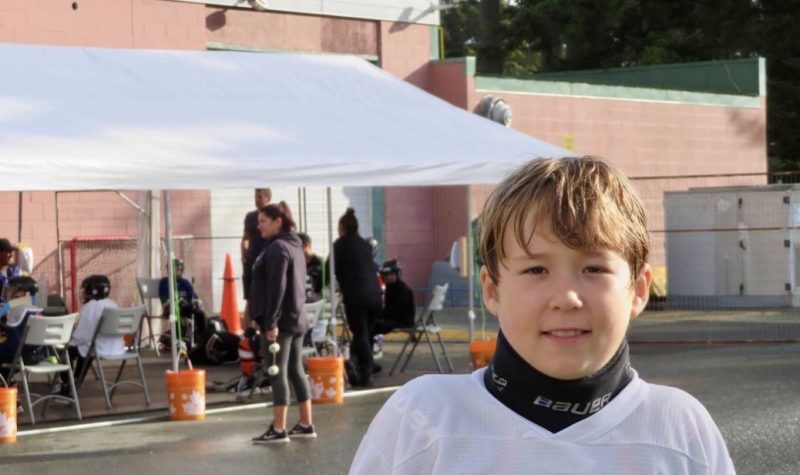How novice hockey is happening in Campbell River, Vancouver Island
By Odette Auger
In the parking lot at Strathcona Gardens Recreation Complex, COVID-19 Ambassadors take in screening checklists, supervise hand sanitizing, as the novice hockey kids arrive at the arena.

During COVID-19, the dressing room is either the parking lot or the forest. Seen here: Harvest Elliott, Novice CRMHA. Photo by Odette Auger.
COVID-19 Ambassadors
The ambassadors are basically replacing the parents — without dressing rooms, the kids show up in all their gear, walking through the parking lot with skate guards. They ensure kids hand sanitize before putting on their gloves, and the masked ambassadors take the guards off and space them out six feet apart along the hallway in the arena.
Campbell River Minor Hockey Association (CRMHA) sends out regular emails outlining COVID-19 protocols. They include updates to how this translates to the arena, assessing how measures were working and making adjustments to troubleshoot.
Jeanine Sumner and Jodi Check Broer are two of the COVID-19 ambassadors trained to support the novice age group. They share their thoughts and explain how things are different this year.
“Upon the kids returning to play,” says Sumner, “Parent volunteers, such as ourselves, also known as COVID-19 ambassadors were identified and trained and that included new entry and exit points, no use of the change rooms. The kids were not allowed inside the building due to the capacity COVID-19 restrictions. So wearing masks, hand, sanitization health check screening for all the kids, ambassadors and coaches minimal contact with any inside the facility and arena, thorough disinfection protocols, tracking number of players, coaches, and volunteers.”
“I think that it’s a big pill for the parents to swallow,” says Broer, “That they can’t see their kids play, but at the end of the day, we’re all just held happy that our kids are on the ice and playing.”
‘Opening the doors …’
Opening the doors to the arena would normally mean entering a fully packed hallway — it would mean dodging exiting players from practice before, parents shepherding young players to dressing rooms, conversations. The benches would be covered in parents, grandparents sitting with coffee, younger siblings running around, playing with toy cars on the stairs, babies keeping warm under blankets.
This year, there is no one. There’s a table with extra screening forms, sanitizers, cleaning supplies. COVID-19 Ambassadors — originally up to five to assist with physically keeping kids separate — now only have two due to overall number limits in arena. The limit of “50” includes operations staff, coaches, COVID-19 support ambassadors and the players.
“The biggest changes that having cohorts is we’re missing that community, seeing everybody all the different age groups, being able to watch the other teams. So that’s a little bit sad, but hey, we’re out here on the ice we’re playing.”
To facilitate these changes, ambassadors and coaches had additional training and the arena itself is different.
Only Rod Brind’Amour area is functioning
Only Rod Brind’Amour arena is functioning — Rink 2 doesn’t have ice in, and it’s filled with spaced out exercise equipment to use as exercise/gym pods.
The kids walk in and, instead of seeing their usual space, Rink 2, they walk down the halls to the Rod Brind’Amour arena. The hallways later serve to direct travel, surfaces are sanitized after the kids walk through, and they don’t return the same way. This ensures the spaces are prepped for the next group. There are markers on walls and rubber mats covering the floors.
Limited capacity is probably the hardest thing, say parents. There is a fair bit of financial investment involved, and their time, energy to get kids to practices…. parents want to watch their kids develop and grow.
These ambassadors are volunteers, and they are also parents of kids playing.
“Keeping kids in sport, keeping them active is very important,” says Sumner, “And we’re just so happy that they’re able to play.”
Coaches
Coaches have also adjusted to the new measures, and these are subject to change as the COVID-19 situation changes.
“We’d like to give a special shout out to all the dads and coaches,” adds Broer, “That are taking their mornings and evenings two or three times a week to coach our little guys, especially lucky to have NHL player Carson Germyn for our age group. So thank you, Carson. Thank you. All the other dads and coaches, we are very blessed to have you.”
Carson Germyn is one of the coaches working with the novice age group, and he discusses what has changed and what has not.
“The kids are excited to be out on the ice and they’re having fun with their friends,” says Germyn, “The ambassadors are doing a great job to keep everybody organized.”
“It’s always in my back of my mind to stay away,” he adds in regards to physical distancing. “I mentioned it to them about keeping our distance and, and they’re aware of it. It’s just for us coaches and just to keep on them.”
“For coaches or any kind of leader, you show that you’re doing it, they will follow. So that’s our biggest thing that I’ve been telling the coaches to stay away.”
There have been some changes to how drills are done during practice, but Germyn describes what’s most challenging.
Keeping the kids away from each other
“It’s also hard to keep the kids away from each other because they’re excited to be out there… we’re trying to do our best to keep them out of each other’s faces.”
They have under five minutes between the end of practice and all players completely out of the building, again that’s to ensure no cross-contamination of co-horts and to stay under 50 persons in the arena at one time.
After the COVID-19 ambassadors help the players get their skate guards on, they are brought to the side door and parents are called. The parents don’t approach close, just wave their kids over, as they appear at the door -one at a time, in quick succession.
The Minor Hockey Association is constantly assessing and updating measures as required, but without the parent volunteers — COVID-19 ambassadors, and coaches, there wouldn’t be any hockey this year for kids. So we’ll end on a thank you to the volunteers at Campbell River Minor Hockey and Strathcona Gardens for the extra work, time and energy they are giving this season.


